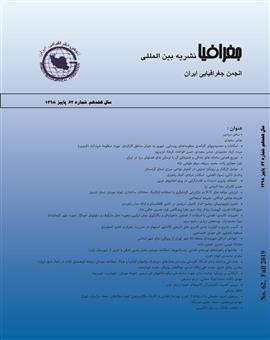عوامل اثرگذار بر رویکرد امنیّتی در آمایش نواحی مرزی استان کردستان
محورهای موضوعی :یاشار ذکی 1 , رسول افضلی 2 , اسکندر مرادی 3 , کمال رنجبری 4
1 - دانشگاه تهران
2 - دانشگاه تهران
3 - دانشگاه پیام نور
4 - جغرافیا
کلید واژه: کلیدواژه: مرز, امنیّت, مناطق مرزی, استان کردستان, آمایش.,
چکیده مقاله :
چکیده موقعیت اقوام و مذاهب در پهنه سرزمینی کشور دارای اهمیت فراوانی در آمایش و چگونگی مدیریت فضایی و توسعه فضایی است. در صورتی که اقوام در مناطق مرزی وجود داشته باشند و گرایشات ناحیهگرایی در بین آن اقوام وجود داشته باشد این وضعیت کشور را با طیفی از فرصت و تهدید مواجه می کند. از یک طرف وجود اقوام در مناطق مرزی میتواند بعنوان لولاهای ژئوپلیتیکی عمل کرده و حوزه نفوذ کشور را ارتقا بخشد و از طرف دیگر گرایشات ناحیهگرایی قومی میتواند کشور را با تهدیدات امنیتی، سیاسی، اقتصادی و اجتماعی مواجه کند. ایران با موقعیت منحصر به فرد خود در خاورمیانه دارای اقوام و مذاهب مختلفی در مناطق مرزی است که در آنسوی مرزها نیز این اقوام دارای عقبه جغرافیایی هستند. کردها در ایران دارای وجه مشترکات متعددی با هسته مرکزی کشور هستند ولی رویکرد امنیتی و تقدم امنیت بر توسعه در آمایش مناطق کردنشین با تاکید بر مناطق مرزی استان کردستان سبب شده که پتانسیلهای باالقوه طبیعی و انسانی این مناطق بارور نشوند و توسعه نیافتگی این مناطق سبب بازتولید مشکلات امنیتی بگردد. این پژوهش از نوع کاربردی و با استفاده از روش توصیفی ـ تحلیلی و منابع کتابخانهای ـ اینترنتی به جمعآوری دادههای مورد بحث پرداخته است و عوامل اثرگذار بر رویکرد امنیّتی در آمایش مناطق کردنشین ایران با تاکید بر مناطق مرزی استان کردستان را با استفاده از دادههای موجود تبیین کرده است. نتایج تحقیق نشان میدهد که عوامل ژئوکالچر، جغرافیایی ـ سیاسی، ژئواکونومی و ژئواستراتژیکی بر رویکرد امنیّتی در آمایش مناطق کردنشین ایران با تاکید بر مناطق مرزی استان کردستان تأثیر داشته است.
The location of the tribes and religions in the territory of the country is of great importance in the management of space and space development. If there are ethnic groups in the border regions and there are regionalismist tendencies among those ethnic groups, this situation poses a country with a range of opportunities and threats. On the one hand, the existence of peoples in the border regions can act as geopolitical hinges and promote the sphere of influence of the country, and, on the other hand, ethno-regionalist tendencies can face the country with security, political, economic and social threats. Iran, with its unique position in the Middle East, has many tribes and religions in the border regions, which are also geographically located on the other side of the border. Kurds in Iran have many common interests with the central core of the country. But the security approach and security priority on development in the Kurdistan region, emphasizing the border regions of Kurdistan province, have caused the potentially natural and human potential of these regions not to be fertilized and the underdevelopment of these areas produces reproduction Get security issues. This applied research and using descriptive analytical method and Internet library sources has been used to collect the data. The factors affecting the security approach in Kurdistan regions are emphasized on the border regions of Kurdistan province, using existing data. has done. The results of the research show that geocultural, geo-political, geo-geomechanical and geostrategic factors have affected the security approach in the Kurdish regions of Iran with an emphasis on the border areas of Kurdistan province.
